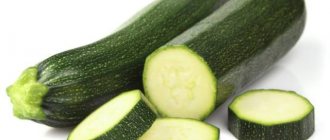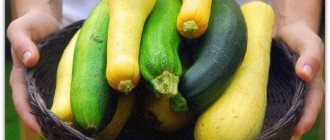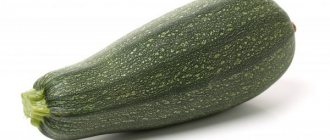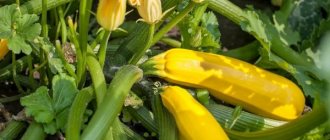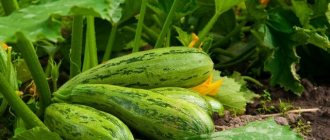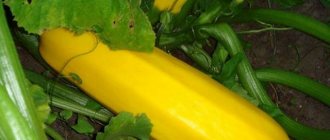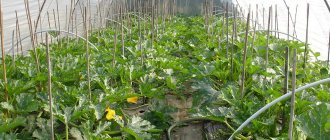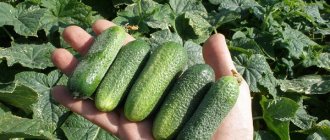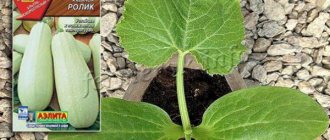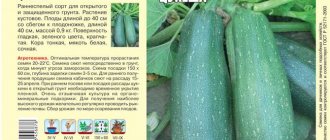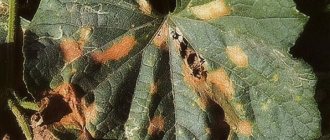Vegetable growing » Zucchini
0
698
Article rating
Kira Stoletova
Zucchini is a crop from the pumpkin family that can often be found in garden plots. It is often used to prepare various dishes. Sometimes you come across fruits with an unpleasant taste. Not all lovers of this vegetable know why bitter squash may appear among the harvest.
Causes of bitterness in zucchini
Why are zucchini bitter?
Mistakes often made by gardeners cause a change in the taste of the crop. There are the most banal and common ones that you should know in advance so as not to commit them.
Varietal features
To avoid the problem of bitter zucchini, choose the right variety. There are varieties of vegetables that, even with proper and careful care, have bitter pulp.
It is best to choose the sweetest types, which include:
- Skvorushka. The fruits are elongated, about 25 cm long, with slight ribbing (almost imperceptible). The pulp is quite dense, tender and juicy, the taste is sweet, there are no bitter notes at all.
- Chaclun. The variety is universal, with delicate pulp, pleasant aroma and taste. Zucchini is suitable for both fresh and harvested use. Provided all rules of agricultural technology are followed, bitterness does not appear.
- Pharaoh. An early variety, the fruits are elongated and dark green in color. The pulp is sweet and tender, there is no bitterness. The fruits reach 60 cm in length and weigh approximately 0.8 kg. One plant produces approximately 9 kg of harvest.
These varieties are considered hardy and are not afraid of unfavorable growing conditions. But they also require proper agricultural technology, which, if violated, may result in an unpleasant bitter taste.
Improper watering
Thanks to moderate soil moisture, plants receive all the elements that are important for fruiting. The culture is not demanding on moisture levels. However, in the absence of sufficient water, nitrates and nitrogen compounds accumulate in the fruits.
High levels of nitrogen cause bitterness in vegetables. The risk increases in the following situations:
- sunny weather, prolonged period of drought;
- zucchini are planted close to plants that take a lot of moisture from the soil;
- The crop is grown in a field where it is difficult to ensure regular moisture.
You can avoid soil drying out if you set the optimal watering regime. First, intensive hydration is performed for two days, and for the next two a break is taken. Thanks to this scheme, the crop quickly gets used to constantly receiving the required amount of moisture.
Lack of sunlight
Like any pumpkin crop, zucchini needs a lot of light and air. These conditions are necessary for the plant to grow properly.
If you make zucchini beds next to large bushes, tall trees or a fence, they will experience severe stress. As a result of the lack of the required amount of sunlight, the fruits develop a bitter taste.
Diseases and pests
Pests or fungal infections can provoke the appearance of bitterness in fruits. Insects injure vegetables and contribute to the spread of the disease. Most often, the crop is affected by fusarium or anthracnose.
The disease can be detected by the following signs:
- anthracnose - round spots of a yellow-brown hue form on the foliage;
- fusarium - the lower leaves turn yellow and begin to dry out.
If the fight against the disease does not bring results, do not wait. Get rid of such a bush immediately. If you delay, the disease can spread to the entire area and nearby crops.
It is much easier to carry out prevention than to try to cure a plant:
- compliance with crop rotation rules;
- clearing the lashes after the crop has been harvested;
- regular weeding and weed removal;
- removal of bushes when infected.
Failure to comply with the feeding schedule
The taste of fruits is directly affected by an excess of certain substances. This problem is often faced by gardeners who prefer to use natural types of fertilizers, which include:
- compost;
- humus;
- litter.
These fertilizers contain high concentrations of unrefined nitrogen compounds, including potassium and magnesium, which cause a bitter taste in the fruit.
The soil and water contain heavy metals, which give an unpleasant taste and accumulate in zucchini. As a result, such fruits become dangerous and are not recommended for consumption.
Unsuitable neighbors
The taste of zucchini can be negatively affected by proximity to certain crops. It is best to plant the following plants as far as possible:
- potato;
- radish;
- tomatoes;
- eggplant;
- pumpkin (decorative).
It is recommended to place beds with onions, peas, spinach and bush beans next to the zucchini. If you plant a decorative pumpkin nearby, its pollen gets blown onto the zucchini by the wind. As a result, the production of hormones is activated, which imparts an unpleasant bitterness to the pulp.
Place unfavorable neighbors at a distance of at least 15 m. If the area is small, plant self-pollinating varieties of zucchini.
Cross-pollination with other crops
Some gardeners are sure that pumpkins should be grown in one area. However, gardeners with extensive experience advise alternating different varieties, planting other plants between them.
As a result of cross-pollination, various negative consequences appear:
- productivity decreases sharply;
- taste qualities change - a bitter taste appears in the pulp;
- fertility is impaired;
- seed quality decreases.
It is not always possible to separate plantings. In this case, you can place beds of onions or legumes between the crops. This helps prevent cross-pollination.
Weeds
Wormwood growing next to zucchini provokes the appearance of strong bitterness in the fruit. If you spot a weed, remove it immediately.
Timely weeding helps to avoid this trouble.
Improper storage
If you neglect the rules for collecting and storing fruits, an unpleasant bitter taste also appears. Harvesting is carried out at different stages of ripeness:
- Dairy – young fruits, soft skin. Stored at a temperature of 0…+3˚С. In such conditions, zucchini lie quietly for about 14 days. Then they begin to wither, their taste is gradually lost, and the flesh becomes bitter and dry.
- Ripe - the fruits are fully formed and have reached the stage of full ripeness. If the vegetables were collected after they are fully ripe, they are perfectly stored for 3-5 months and do not lose their quality. It is recommended to store ripe fruits in a cool and dry pantry or basement. The main thing is that the room has good ventilation.
Not all varieties are suitable for long-term storage. There are varieties that are consumed fresh.
Accumulation of cucurbitacin
This is one of the most common causes of bitterness in vegetables. Cucurbitacin is a substance produced in response to stress experienced by the plant. Most often this happens due to improper cultivation.
There are several effective methods to prevent the production of cucurbitacin:
- proper care of the plant;
- timely watering;
- no excess or shortage of fertilizers;
- planting the crop in an open and sunny place where there is no constant shade.
How to eliminate bitterness?
After harvesting, you may notice an unpleasant bitter taste, which you can get rid of. To do this, you just need to soak the fruits well. The procedure is carried out according to the following scheme:
- Wash and peel the vegetables thoroughly. Be sure to remove the hard layer, as bitterness accumulates in it.
- Cut the peeled fruits into not very thick pieces or circles.
- Salt the water - for 3 liters take 1 tbsp. l. salt.
- Place the prepared vegetables into the liquid and leave for 20-30 minutes.
- After the specified time, remove the vegetables and rinse well with plenty of running water. Now zucchini can be used to prepare various dishes.
It is easy to remove bitterness using the freezing method. Before eating, place the vegetables, cut into circles, in the freezer and leave for a while until they are completely frozen.
After defrosting, elasticity is lost, so when cooked, zucchini can turn into porridge.
Preventive and therapeutic measures
It is difficult to determine the type of poisoning in the first stages, so it is necessary to carry out emergency care according to a uniform pattern. It is necessary to intensively carry out measures aimed at removing toxins from the body. The first step is gastric lavage. The patient should drink several glasses of lightly salted water or a weak solution of potassium permanganate, and then induce vomiting. This can be done by influencing the receptors of the root of the tongue.
It is recommended to do this several times to completely remove harmful substances from the body. The next mandatory action is taking the sorbent drug. It could be ordinary activated carbon or Smecta. Any medications should be used in accordance with the instructions.
If poisoning occurs in a pregnant woman, child or elderly person, contact a doctor should be done immediately . It is also worth seeking qualified medical assistance if symptoms persist for more than 48 hours or the condition worsens. The signal can also be dark urine, uneven breathing and “veils before the eyes.”
To avoid this situation, you should buy zucchini only at trusted retail outlets. Before cooking, be sure to rinse the product with running water. When it comes to preservation, it is important to carefully carry out the sterilization procedure. It is also important to store food correctly (in the refrigerator, in a closed container).
We recommend: Cheese poisoning
Is it possible to eat bitter zucchini?
The fruits are edible if the bitter taste was not caused by a fungal infection, but was the result of a violation of the rules of cultivation and care. Consider also how strong the bitterness is.
If the cause is a plant disease, the fruits may contain nitrates and various toxic substances in large quantities. If you consume such fruits, there is a risk of serious poisoning.
If vegetables acquire a pronounced taste, they are absolutely not suitable for consumption.
Eating
If a very bitter zucchini with the taste of wormwood has grown in the garden, its consumption is fraught with health consequences, since:
- accumulation of curcubitacins in tissues threatens body poisoning, nausea, vomiting and other deplorable reactions from the gastrointestinal tract;
- Eating a dish of bitter squash can cause irritation (burns) of the oral mucosa. Irritation of the mucous membranes of the nose and eyes is also observed;
- substances in the composition can cause attacks of gastritis and stomach ulcers.
Nausea is a symptom of bitter squash poisoning When
thinking about why squash is bitter like wormwood, it is worth knowing that curcubitacins in large quantities can be extremely toxic.
How to prevent the accumulation of bitterness?
By following simple but important rules for caring for zucchini, it is easy to grow tasty and healthy vegetables that will benefit the body. In the case of a properly selected variety, the accumulation of bitterness is the result of growing in inappropriate conditions.
To prevent the accumulation of bitterness in vegetables, follow a few simple recommendations:
- Plant seeds only during long daylight hours;
- ensure the correct watering regime, moisturizing should be regular;
- make sure that the soil does not become waterlogged;
- plan your plantings in advance so that the zucchini does not grow close to plants that lead to the appearance of an unpleasant taste in the fruit;
- do not use potassium and phosphorus types of fertilizers in large quantities.
Bitter squash are the exception to the rule. If you follow simple requirements for growing and caring for this crop, it is easy to avoid such a nuisance. Also, choose the right varieties that do not have bitter notes.
0
0
Copy link
Improper storage
To maintain taste, you must follow the preservation rules. If harvested incorrectly, vegetables may change at this stage.
Very young vegetables do not last long. The shelf life is 12-15 days. The required storage temperature is 0-2 degrees. Longer storage is possible, but there is a high probability of rotting.
Mature zucchini remains fresh for up to 6 months. Storage requires a ventilated, cool place. The best option would be an attic or home veranda. This will eliminate the risk of bitterness. Many people keep fruits in the closet or under the bed. It is not recommended to store crops in a cellar where there is no ventilation.
Too long storage leads to loss of taste, the amount of useful elements decreases, and vegetables become overripe. Vegetables should not be stored for longer than five or six months. Seed germination will begin and an unpleasant bitter taste will appear.
